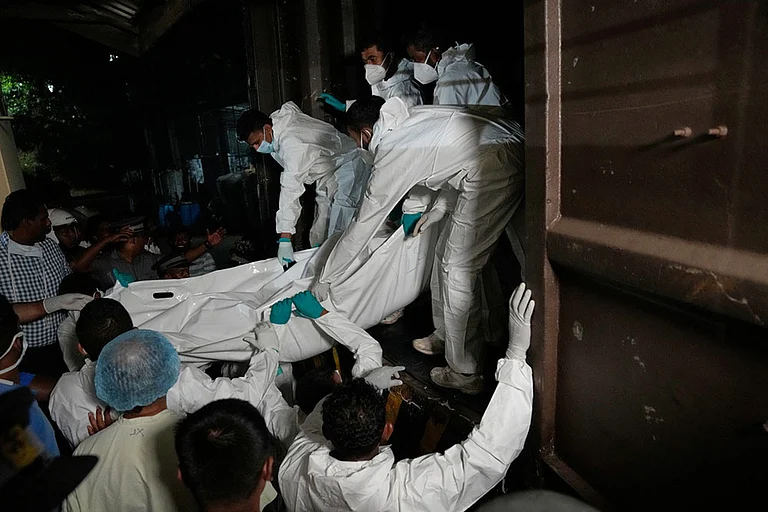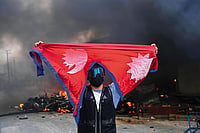Pakistan on Saturday reopened a border crossing with Afghanistan that it closed earlier over a tussle with the Afghan Taliban over terrorism.
The Taliban is in charge of Afghanistan since its toppled the West-backed Kabul government in August 2021. Since then, there has been tension between Afghan Taliban and Pakistan over cross-border violence and terrorism.
Earlier, Pakistan closed the Torkham border for vehicular traffic for the last six days amidst bilateral tensions. It was opened on Saturday, allowing the movement of over 7,000 trucks stranded.
What is Torkham border?
The Torkham border crossing is a vital commercial artery and a trade route for Pakistan to Central Asian countries.
The Torkham crossing was shut by the Afghan Taliban on Sunday after Islamabad accused Kabul of providing safe havens to the Tehrik-i-Taliban Pakistan (TTP) terrorists whose cross-border attacks have led to a spike in violence in this country.
Earlier, the Pakistan government reopened the Torkham border only for pedestrians while over 7,000 trucks laden with goods, including perishable items like vegetables, poultry, and eggs, were stranded.
Torkham border from the Pakistani side has been opened and all vehicular movement including that of cargoes has started, said Director Pak-Afghan Joint Chamber of Commerce and Industry (PAJCCI), Zia-ul-Haq Sarhadi.
Sarhadi had earlier said that the border closure would inflict enormous losses to exporters and businessmen if the Pakistani government did not open the gate.
Torkham crossing closure caused Rs 270 million loss: Report
The Express Tribune newspaper reported that the closure of the Torkham crossing caused a loss of Pakistani Rs 270 million to the exchequer.
The Afghan side opened the gate on Thursday but it remained closed from the Pakistani side, causing concern among businessmen and other stakeholders of the Pak-Afghan trade.
Closure of the border is not only inflicting losses in millions of rupees to the national exchequer but also creating a lot of problems for ailing Afghans who want to come here for treatment, Zia had said.
The Torkham crossing was opened after a high-level Pakistani delegation visited Kabul to hold talks with Taliban officials, noted Tribune.
It reported, "The decision to reopen the border crossing by Afghan Taliban came a day after a high-level Pakistani delegation, led by Defence Minister Khawaja Asif, visited Kabul to discuss security and other matters.
"Asif was accompanied on the unannounced visit to the Afghan capital by Director General Inter-Services Intelligence (ISI) Lt General Nadeem Anjum, Foreign Secretary Asad Majid and Special envoy on Afghanistan Ambassador Muhammad Sadiq."
This is the second top-level visit from Pakistan to Afghanistan in recent weeks. The first was by Minister of State for Foreign Affairs Hina Rabbani Khar who visited Kabul in November and met the Taliban brass.
What's Tehrik-i-Taliban Pakistan?
The Tehrik-i-Taliban Pakistan (TTP) is a terrorist organisation active in Pakistan. It's believed to have a presence in Afghanistan as well.
In recent months, The TTP has mounted a series of attacks inside Pakistan that have killed hundreds, including the deadly Peshawar bombing that killed over 100 and injured over 200.
The TTP was until a few months back in negotiations with the Pakistani government, but then it walked out of the talks and announced an offensive against the Pakistani state.
The TTP was formed in 2007 to oppose both the Pakistani military in Pakistan and Western military presence in Afghanistan.
The US National Counterterrorism Center (NCTC) says, "Tehrik-e Taliban Pakistan (TTP) is an alliance of militant networks formed in 2007 to unify opposition against the Pakistani military. TTP’s stated objectives are the expulsion of Islamabad’s influence in the Federally Administered Tribal Areas and neighboring Khyber Pakhtunkhwa Province in Pakistan, the implementation of a strict interpretation of sharia throughout Pakistan...TTP leaders also publicly say that the group seeks to establish an Islamic caliphate in Pakistan that would require the overthrow of the Pakistani Government."
The TTP is committed to the establishment of an Islamic Caliphate in Pakistan by overthrowing the current Pakistani state. The Caliphate is a term that Islamist terrorist groups often use to refer to their Islamic states. The word is rooted in historic Islamic kingdomes ruled by Caliphs.
The TTP also links with the Afghan Taliban and terrorist groun Al Qaeda, notes think tank Counter Extremism Project (CEP).
The CEP says, "As an ally of the Afghan Taliban, the TTP also fought the US-backed Afghan government prior to the latter’s defeat in August 2021. The TTP was founded in late 2007 by a group of Pakistani militants who had previously fought in Afghanistan alongside both the Taliban and al-Qaeda, and the group has maintained close ties to both organisations since."
The CEP further notes, "TTP militants regularly conduct attacks against civilians, security forces, and political leaders in both Pakistan and Afghanistan, using everything from small arms to IEDs to suicide bombers. Among their most high-profile attacks was the December 16, 2014, attack on an army-run school in Peshawar, Pakistan, in which nine militants killed 145 people, including 132 children, using grenades, guns, and suicide vests."
Pakistan had hoped that the Afghan Taliban after coming to power would use influence over the TTP to make peace with Pakistan but the expectation remained largely unfulfilled.
Not only the TTP has refused to budge on its key demand to undo the merger of the tribal region with Khyber-Pakhtunkhwa province but also demanded the Pakistan authorities release its prisoners as a confidence-building measure to move forward in talks.
It is not clear if the Afghan Taliban were not using their influence on the TTP or if the latter refused to accept their pressure.
Pakistan security sources allege that the Afghans were apparently not ready to sour their ties with Pakistani militants who had fought with them against the NATO forces.
The lack of action on the part of the Afghan has increased mistrust between Kabul and Islamabad but the two sides know the importance of their ties and are working to remove irritants.
(With PTI inputs)





















